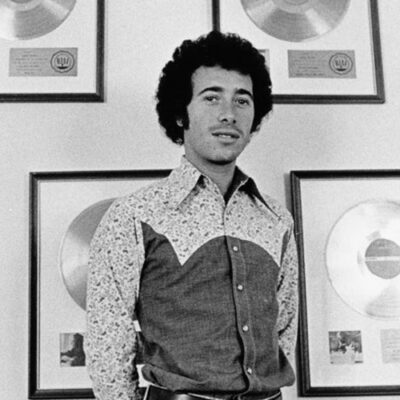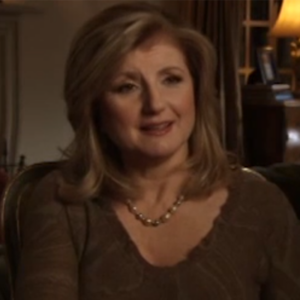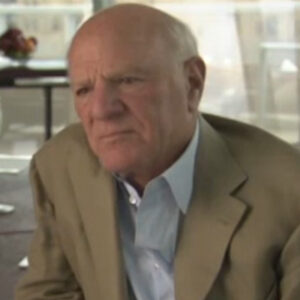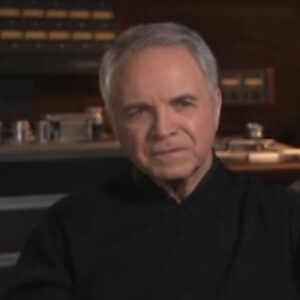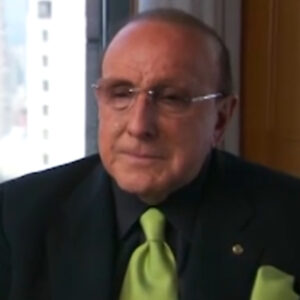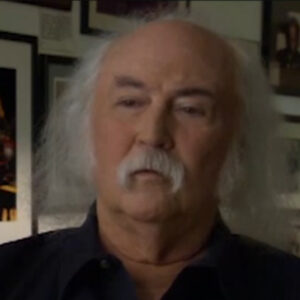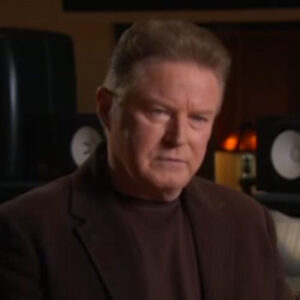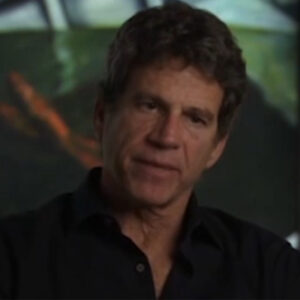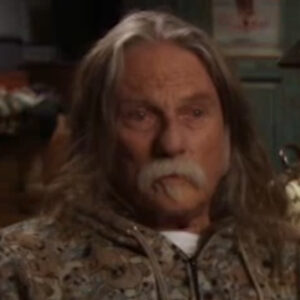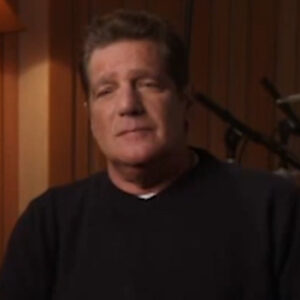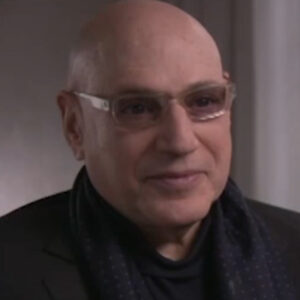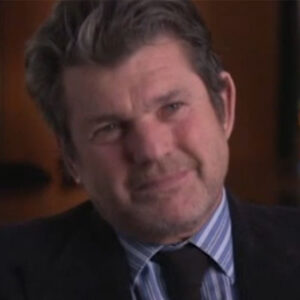Speaker Well, actually, you know, I grew up in Midwest.
Speaker I grew up in a little town called Danville, Illinois, and I was at school at the University of Illinois and a premed curriculum. And a couple of my fraternity brothers and stuff were in bands. And I had some sort of putting my way through college booking bands. And as as things would have it, you know, some of these people were there was at the University of Illinois in Champaign, and some of these people were really talented. So a natural outgrowth of this, rather than just being a booking agent, was to manage these guys and trying to escape the Midwest and make record deals and and get out of there. So essentially, I I landed in California is the. My grandmother was here and my aunt was here. And it was the lesser of two evils to New York and California. And I’d actually gone for a job interview in Chicago with Frank Barcelona the big time he had a premiere talent that time. And when I got to meet with Frank and in Chicago, it was at the old Aaron Russo’s old kinetic playground. Led Zeppelin was the act to play that night. And I got there and the place had burned to the ground. And all it was there was a bunch. So I thought that was a signal to go to California. So I’d made the decision to go to California and I actually was coming to California.
Speaker I had managed this one band called Orio Speedwagon who were local guys, and we secured a record deal on what was then Epic Records division of then Columbia, which is now Sony. But I also manage another artist that I really believed in. So I. His name is Dan Fogelberg. And, you know, my first knowledge of David Geffen was Dan Fogelberg had walked into my Indore. We shared a house together and walked into my bedroom. I think it was a Rolling Stone magazine with a little story about this guy, David Geffen, who was starting this record label called Asylum Records.
Speaker And Dan had done all this research and said, this is who I want to sign with. So my first trip West was really to seek out David and Trango, play him some Dan Fogelberg music. So I had just picked up the phone, call him. He picked up the phone. He said, send me something. I’d send him something called him. Call me right back. Said, You know, this is very good.
Speaker You know, I played it for my friend Jackson Browne, who’s this new upcoming artist that we have. And he thought it was very good, too. But right now, you know, I have too many things, so you’re gonna have to wait. So then, you know, I said basically stayed in touch with them, you know, every three, four months or so. And then Dan and I decided to move out to California.
Speaker So then we moved to California and sought out David for Dan.
Speaker And David basically said the same thing, which was right now I have too many things that asylum. I think this is really good if you guys can just wait. But Dan was obviously very eager.
Speaker And then Clive Davis came along from Columbia Records and Dan also signed to EPIC at that point, actually, first album was on Columbia. So, you know. But, you know, Dan’s dream and my advice was always, you know, wait and sign with asylum. But, you know, when Clive Davis came calling you, you had to go with it.
Speaker It was kind of a label to be at that point, wasn’t it?
Speaker Yeah. But, you know, obviously, everything that asylum stood for, you know, in Dan’s, you know, he he would play Buffalo Springfield and all those kind of things and and and Joni Mitchell and some of those things. I remember we’d gone up to Chicago to a Joni Mitchell concert, you know, and Dan had we’re actually walking down Rush Street and Joni happened to be just like walking down the street and, you know, he walked up to her and gave him her, given this tape at the time and things like that. So no, but but if Dan had to do all over again, he obviously would have signed with asylum and, you know, but the things worked out as they work out.
Speaker And so what I mean, let’s talk about silent for one second and then we can go back. Right. David’s management company after that. But just I mean, what was sort of the the news coming out of David’s new company? What was that all about?
Speaker Well, you know, the vibe was that it was a very singer songwriter artist, you know, West Coast. Kind of oriented vibe. And, you know, the business of imaging. And, you know, David really understood that. And he’d imaged it around the artists that I guess he was working with his managers. Is this place there was gonna be, you know, like this safehaven small, well distributed.
Speaker That point was distributed by Atlantic Records. And everybody wants to be there, you know? And later on, you know, one after I met the Eagles, who I met through David. You know, similarly, you know, they sought him out for the same reasons. Dan Fogelberg sought him out.
Speaker So. So you’re out in L.A., you bring the team. Yeah.
Speaker Yeah, I moved here. What were your first impressions of Dana? What do you think? What do you think of this guy?
Speaker You know, I first saw when I moved L.A., I, I had agreed to take a job as a booking agent for a guy named Jerry Heller, had a company called the Heller Fischell Agency and coincidentally, Jerry Jerry’s office. And we were all in that nine thousand ninety two hundred twin, I think was ninety one hundred block of sunset. So when you got there, this was kind of the hot little area. So basically you had Dick Clark Productions on the north side of the street. On the second floor, there was Jerry Heller’s office where I took a job and went to work. Okay, so he’s managing Dan and REO Speedwagon and and, you know, my day job to pay the bills as I was an agent working for I’m working for Jerry. You know, I sold my business, my booking business in Illinois, and we just packed up and moved out here. And coincidentally, you know, Jerry had a relationship with David because we were he was booking Crosby and Nash when they worked, as is that. And David Blue, who is an asylum artist that was a friend of David’s slice. So I kind of got an immediate end with David because I was actually I was the one the new kid in the office. So I was the one booking the David Blue dates. So, you know, and look for it from the earliest time you met David. He was, you know, driven beyond belief, you know. You know, very, very obviously, very, very definite firm, opinionated. You know, I’ve never seen anybody, you know, take the information in and say yes or no. You know, and throughout my career, one thing, you know, one thing that’s really aggravating. You know, maybes are really aggravating thing. I would much rather hear. No, you know, than maybe, you know, in any you know. So, you know, my earliest impressions, David, the same ones I have now, you know, he’s, you know, brilliant beyond, you know, brilliance, very opinionated and very definite. And if, you know, if he believes in something, he believes a thousand percent. And when he says yes, it’s yes. And when he says no, it’s no.
Speaker So that that was kind of the the way it went. So.
Speaker So how did you end up working management company?
Speaker I saw I did a stint with with Jerry. And as people do in this business, especially in that time, Jerry sort of imploded. You know, he kind of had some personal habits, shall we say, and that sort of through the business away. He sort of fell out with David. I moved over to a bigger booking agency called Associated Booking Agency, which I later learned, you know, was possibly tied to certain mob influences. You know, I later found out that, you know, a guy named Sidney Korczak, who’s a big name around Hollywood at the time, you know, you’ve read all the books. But but anyway, was, you know, in the office upstairs from us and that. And so I moved over to associated booking and, you know, became kind of a very I’d call myself a moderately important agent at that point, you know, represent a lot of a lot of big name talent there. And I was working Associate Booking Corporation and still trying to get our REO Speedwagon and Dan Fogelberg careers launched. And also in that that particular time, another guy kind of entrusted me with the manager’s Sipes career, a guy named Joe Walsh who had left the James gang and remained friendly. And with David and with Elliott, I was booking new asylum called Jo-Jo Gun for David and some other things. And one day, you know, phone rang believe was Elliot first who said David’s gonna sell asylum. It’s going to be merged with Elektra and he’s gonna go off and run Elektra Asylum. And we’d like to talk to you about coming over here to we’re going to change the name from Geffen Robert’s management to G.R. management. And we need help, you know. Would you be interested in coming to the management company? And I basically said, if I can bring these friends of mine who are none of whom, by the way, met much at the time, bring them with me and come there, you know. Yeah, I’d love to do that. So that, you know, so I sort of walked in the door at G.R.. It was. G.R. management, David, had moved out of the building over to over Onda to La Cienega to run elect what was now going to be called Elektro Silom.
Speaker But he was still obviously he couldn’t. He did not, you know, abandon his show. He says relationships, his responsibilities into the old management clients or helping Elliot or are any of that.
Speaker And shortly after I got there, I had, you know, a couple of friends working there, John Hartman and Harlan Goodman. Harlan had been an agent at the Way Morris Agency in Chicago. And I knew him from when I was at school at the University of Illinois, had done a lot of business with him. And it’s kind of this fraternal thing. Within minutes or days of me getting there, John and Harlan had some sort of falling out. Dave and Elliot and we’re gone. So suddenly now it’s Elliott and myself, basically, and Ron Stone. And I’m sitting there and Elliott was you know, I don’t really know that much about touring. And you were an agent, wanted to just kind of take over the touring thing, you know, so suddenly I’d gone from a guy that had a man trying to manage a couple of emerging acts to I was sitting in the seat of, you know, arguably the most powerful management company in the business. And suddenly, you know, it was, you know, hey, go book this Joni Mitchell tour. Neil, go book this Neil Young tour. Go book this Crosby, Stills and Nash tour. Oh, and by the way, you have these bands, The Eagles and Pocho and this new band, you know, the Eagles and this other band, America. And it just. And Jackson Browne and Ned Doheny and just, you know, it was like a kid in a candy store, you know. But David was really, you know, devoting the lion’s share of his time at that point to running Elektra Asylum. And so, you know, they’re sad, Elliott and I with John and Harlan gone and out the door. So an incredible opportunity, incredible learning time. And the you know, as we look back on it, you know, that was a time, you know, when any of us that were pursuing the American dream, you know, if you get in the music business now, you know, you’re not going to do it no matter what happens. You’re not going to experience what we experience, what the opportunities were, you know, and the risk to reward ratio then was, you know, you know far better than anybody’s odds now of trying to, you know, accomplish what any of us did through that. But, you know, mice, I you know, I credit my stint at at the management company. You know, it’s like, you know you know how you have the good luck and the good timing and and all that. You know, it was the pivotal move that really launched my career. I learned, you know, tons of stuff from obviously from both David and Elliot. But, you know, I got to say, you know, that I’ve been around you know, you mentioned all these names out there. You know, the executive titans in our business. You know, I know them all. You know, I’m now the old guy, you know, so that I’ve known them all now 30, 40 years. And if you asked me, you know, who did you learn the most from or, you know, who do you think? You know? It’s no accident that he accomplished what he did. You know, unequivocally, it’s David. You know, now, you know, the years of egos, you know, of the you know, everyone will go well, ometer Tigon and Clive Davis smoe Austin. You know, these are the guys that had accomplished the most in the record business and that, you know. But clearly, David, career, you know, accomplished, you know, more than everybody added up.
Speaker He certainly went in a lot of different directions that they didn’t go in. Yeah. You brought up a couple of points. I just want to go back to. One is just.
Speaker Can you just set the stage? I mean, the rock business was in its infancy, wasn’t there wasn’t. And there was barely a business. I mean, it’s just sort of it was sort of a burgeoning.
Speaker Well, I’ll give you something I remember. OK. So I walk in there and Elliott says we have to book a tour on Crosby, Stills and Nash. I think it was.
Speaker I had no perspective. How much is they? Are they worth? They’ve never really worked as Crosby, Stills and Nash. You know, I think they’d work to see us and why. So I just kind of went in the files, started looking through the stuff, and I started picking up. There were Steve there’d been a Stephen Stills solo tour, you know, and in those days, you know, when I was associate booking, I would book like the Allman Brothers in a big show. Seventy five hundred or ten thousand dollars a night. And I was going through the. So is going through I would go through files and I ran across these files, Stephen Stills and it was fifty thousand dollars show. Seventy five thousand dollars a show, you know. And so I ran into Elliot and I said, this can’t be right.
Speaker And he says, Oh, yeah, David booked that tour, you know? So I was like, you know, David, pick up the phone and called those days you had five teams of promoters across the country. So, you know, it was Frank Freedon Chicago and Don Law in New York and Bill Graham and Donald in Boston and Bill Graham in New York and San Francisco. And, you know, so it was these guys, you know, and it was just the business was really controlled by a handful of managers and a handful of loquat promoters that own their geographic areas. I wouldn’t say that the business was in its infancy. The business was really, I think, at its height, because those days when you broke, you broke huge. You had a hit record, you sold out the forum, you had a hit record. You played a week at the Greek in L.A., you know. Now, what did that mean? That means that, like. Oh, during that time, you know, an Elton John, Bette Midler, all these people, Joni Mitchell, they would all come in and they would start at the Doug Western’s troubadour, you know, and Doug would one big war we had was Doug wanted all these options. So to let you play a week at the Troubadour for fifteen hundred dollars. He then had to come back and play a week for 1750 and a week for two thousand. But you had one big hit. You were ready to sell out the forum, you know. And and so, you know, when you really say that the rock business wasn’t as much in its infancy, was in its explosive stage, because what had happened prior to this is, you know, in, you know, rooms like the Fillmore’s up in San Francisco and the Boston Tea Party and the electric factory in Philly.
Speaker Now, it was straight to the arenas. You’re playing Madison Square Garden, the forum, you know, a Chicago stadium, you know, and these were these you know, it really had exploded exciting times.
Speaker I think that was really fun. So just going back to something you said about asylum. Well, first, let me ask you.
Speaker There was this issue of conflict of interest with Dave. And I think when he had to really had to take himself out of the management business because he was becoming his executive orders and he couldn’t be he couldn’t have an Asia.
Speaker Well, look, the business has obviously changed now or the music business today. The record labels are taking pieces of, you know, everybody’s everywhere. You know, I more than David have been touted as how can you be the manager, you know, and the ticketing company, and now you’re trying to be the promoter. But you know that in those days was a hotbed. OK, then people would go, well, you really shouldn’t be the manager and the record company because then who’s going to fight with the record company? Who’s really even in those days, we thought it was an invalid concern, you know? And one thing that that, you know, if you had basically the best interests of an artist at heart, which is something that really that, you know, David, my joke, you know, about artists being a pain in the ass or something. But at the end of the day, he respected talent, you know, and when. And, you know, when he decided something was really good, he really had a passion for it and he would really fight for it. So, you know, I’m more than anybody. Subscribe to the theory of you wanted David to still be interested in the management company. I doubt he ever took another nickel out of the management company after he got to Elektra Asylum at that point. He certainly didn’t need it or want it. But, you know, the whole idea to me, the obvious thing, you know, if you had that passionate guy more involved, invested in your well being. I never saw it.
Speaker You know, that that that kind of thing was a problem.
Speaker You know, after I started managing the Eagles, you know, they they were very.
Speaker Hey, wait a minute. They’ve got our publishing. We’re signed to the record deal. They’re the managers, you know, all that kind of stuff. But that was really, you know, that was kind of started by John Hartman and those guys trying to stir it up because they were trying to figure out a way to leave with the Eagles. And and things like that. And the Eagles were, you know, as as then as today, you know, really edgy, intelligent, you know, music business people, as well as just the most creative people alive. It’s just your natural ebb and flow of what the music business is. But I think that criticism is, you know, been overplayed.
Speaker So asylum.
Speaker You know, David, I think you had it on his own for two years and he sold 50 percent back to Warners after a couple of years, basically, and then he became the same electorate re-elected or something like asylum.
Speaker How did the artist feel about it?
Speaker Well, first of all. My feeling about asylum was, you know, he yes, he wanted commercial success. He won. It was a business. He won sell a lot of records. But when he explained to me why he couldn’t sign Dan Fogelberg now, it was because he had commitments to people like Ned Doheny, David Blue and Judy Sell.
Speaker These were artists that were, in my opinion. And it turned out to be true, far less commercial than Dan Fogelberg. But he had his Joni Mitchell and he had his Jackson Browne and he had his eagles. And he was balancing the roster, which is not those people that he thought could break through to golden platinum status, but just also people who deserve to have their music heard and marketed.
Speaker So, you know, I think that, you know, the move to Elektra Asylum for David, I would guess if you asked him now and then he would say was more fun running asylum than it was running Elektra, Siloam, where you inherited, you know, a bunch of staff and bigger artists of different music types and stuff that I think probably weren’t as enjoyable for him to work on as others did.
Speaker I mean, what. And just from the artist’s point of view. Is it like that was a big change and David was leaving and going off to do something else?
Speaker Let’s listen. Here’s the standard thing. What artist thinks about record companies when things are going well, they love it. And when, you know, a record doesn’t sell. Very few of them, you know, can admit that they might not have made a record that the public didn’t want to buy. So, you know, if you were selling records, you were very happy with your record company.
Speaker If you weren’t selling records, you know who is, you know, then then you weren’t happy, you know, and that goes for every guy that’s run a record company for the end of time. Now, there are executives that have a higher percent. If you if you run a likability and if you want to pull the way we do politicians. You know, I you know, I you know, it really comes down to, you know, how well did my record sell? You know, artists are basically very needy people who care about themselves first.
Speaker And everybody, you know, they’re number one to ninety nine. And, you know, everybody else is number one hundred in most issues, which is, you know, the way it should be.
Speaker But I mean, that’s hard. That’s hard. It’s hard to manage those relationships.
Speaker I mean, you have to be you have to be supportive.
Speaker So, yeah, they did. Look, David, had we all had our share of scrapes, you know, but David had his share of scrapes with, you know, well documented. You know you know, he’s had fights with artists and fights with other people. But, you know, it’s I don’t I you know, as a as a head of a record company, I think he gets, you know, Ali, even talking more about the Geffen Records years. He you know, if you really separate is his running record labels in the three phases, Asylum, Elektra, Asylum, and then later Geffen. You know, he did it three times successfully, three, four, three. You know, the record business even then was a business, kind of like baseball. If you bat 30 percent, you know, you’re leading the league. So he went three for three. There’s a there’s a reason for that. You know, in Geffen Records, you know, when you start talking about Guns and Roses and Aerosmith and Share and all the great things that that really happened there, it you know, and he did it at a time when urban music was really a big part of the music. And he came out and said, hey, I don’t know anything about urban music, so I’m not going to try to pretend and learn it. I’m just going to do what I know about. And, you know, there was very, very, you know, legendary, successful run. I think he gets less. I think he I think when people look at his career, they you know, they now look at him as, you know, this great business tycoon. But, you know, he made it in the music business. And just, you know, if, you know, just if somebody is going on Wikipedia and writing about David, I don’t think, you know, maybe just because I’m older and I was around, I don’t think people give as much credibility to what he accomplished in the record business back then, you know, because they look at him for more of the DreamWorks and, you know, some of the other things that have gone on more recently.
Speaker What did I mean? If you look back on it, what do you think David, can contribute to that era?
Speaker Well, he built three successful labels in a row. And, by the way, left the business. You know, my recollection was there was the health scare, which I’m sure you know about. But he left. He left the business, ran off to the movie business, and then came back and still did it again after haven’t been away.
Speaker So, you know, but, you know, if you look at the you know, the commercial, if you exploit those, you know, those recorded records that were left that he’s left behind, you know, it starts with the Eagles and Joni Mitchell and Bob Dylan and the band and bunches of those. Records to the asylum years, Jackson Browne, Linda Ronstadt. You know, straight through then into the Gaffin years, you know. You know, Guns and Roses, Aerosmith, Cher. I mean, the list is, you know, big list.
Speaker That’s great. You’re really good at this. All right.
Speaker Thank you. I practiced by testifying before House and Senate subcommittee.
Speaker OK. We’re going to move out of here in a second. I just want to ask you, you can leave that in if you want.
Speaker You said we.
Speaker You said you learned a lot from David and from Elliott in those years. Right.
Speaker More from David than L.A..
Speaker To be honest, I mean, what was the yin and yang between David and Goliath?
Speaker Well, Eliot was the Ellie was the laid back guy that was willing to go sit up with Neil Young till six or eight in the morning.
Speaker And was the hang guy and would stay in the studio and roll the joints or do whatever needed to be done. And, you know, David was the you know, had less attention span, was more the business guy, you know. So that was the yin and yang. You had one guy that could play Kate, you know, these very big egos that were especially big, bigger van than artists would be now.
Speaker And then, you know, David was, you know, the business guy, you know. I’ve you know, I, I think I you know, I I saw both sides of it. You know, I think I got I got music, being a music manager, lessons from both of them. But, you know, I got more life business lessons from David.
Speaker Can you think of any of this?
Speaker Was it something you saw him do? Well, let’s just say, you know, couple things.
Speaker Return all the phone calls. Yes or no, not maybe be decisive.
Speaker You know, one thing that he really taught me and I didn’t know at the time was you got to look at who you’re dealing with him and you’re dealing with somebody as smart as David.
Speaker You don’t try because he can just smell it and just wipe it right out. I spent years trying David Geffen, and the best thing he ever taught me was, hey, the. You know, I invented this crap. You know that I know that you’re full.
Speaker And what you’re saying here, you know, and it’s something I learned for him and, you know, I. And recently, I actually chuckled because there’s two younger guys in the business that were pulling some shenanigans on me. And I thought back to, hey, I know exactly what they’re doing because I tried to do this to David and he busted me and he said to me, You’ll learn from this. I didn’t learn till 30 years later really what he was talking about. And the other thing, you know, was that, you know, David David would you know, returns is a real estate deal or whatever it was like. You know, the thing he taught me was it was kind of in the pursuit of the American dream. You know, you never set your goals. You know, you never limit would limit, you know, where you set the bar. You know, he’s another thing.
Speaker You know, David was like the first guy in my life that set the bar really high. And like, he was a totally natural thing to him. Like and he he you know, he basically would tell us, he said, I’m happy, you know, those days when we talked about be a billionaire. But you talked about you know, he talked about I’m going to be really rich. And he was really rich at the time. But he says, I’m going to be really, really rich. And it would just he would just he kind of taught me, you know you know, you’re going to set up, you know, set a bar. Why not set it really high?
Speaker I mean, what do you think? This just sort of became sort of a mystery. You know, I mean, I was his mother was a huge influence.
Speaker I was I was going to say, you know, he he talked a lot about his mother and, you know, and and his you know, she drove him. I know. And his and that and, you know, almost almost all of us.
Speaker From kind of those days, I’ll quit school, kind of all work at agencies and then moved into other stuff, all came from kind of, you know, lower to middle class, you know, Jewish upbringings. We all kind of shared that, Eliot. David, you know, groups of us.
Speaker So.
Speaker Can you just do mean just describe. I don’t know if you can just describe kind of that you’ve done it a little bit, but this sort of thing that Gaffin Roberts office was, it’s sort of like a like you can imagine. Yeah. And we have Neil coming in and joining. Going out.
Speaker So here, here, here is kind of the I started out on the stage in the 90 100 block of sunset in those days. I think Gaffin Roberts is 90, 120. Okay. And what it was was on the north side of the street, you had the Dick Clark Productions, the Clerks offices. And then we were on the South Side. So it was kind of a housing bungalow type stuff. You know, it’s where Ron Burkle’s offices are now. And we had two stories and kind of the middle of the block. And there was a receptionist and a couple little like road manager offices downstairs. And then we were all upstairs on one Lahor. And it was really like a house, you know. No real desks. You know, we all had couches and coffee tables laying around, you know, and people would. Yeah. People artists would wander in and out. But, you know, to the left of us on the street was the old Apple Records, Beatle offices, you know, and Dick Clark across the street. And we were right there. And upstairs next door was Hoagy Carmichael lived in a an apartment and never gave it up and see it hear him playing piano. And it was kind of. Yeah. But the artists would kind of just roll in and out, lay around. You know, Elliot’s office kind of became the artists lounge, you know. And David, you know you know, I actually ended up in David’s office when he because I came there when he left to go over to La Cienega, to the electro Silom building.
Speaker So then I inherited David’s office. It was great. It was it was great fun.
Speaker So any I mean, anything you want to say that I mean, in those days, I mean, can you give a quick description of. He was funny. He was.
Speaker Yeah.
Speaker Elliott in those days was kind of. Every artist, best friend. And he was, you know, there to share a joint. Talk about your girlfriend and, you know, talk about scheduling and sound and lights and who’s doing you cover, you know. But he pretty much stayed away from the deals and dealt more with the, you know, the day to day of the handholding.
Speaker I get the sense that David was like, Dad.
Speaker You know, I don’t know if they ever discussed it and decided it just it was their natural roles that they did.
Speaker You know, David had no desire to do what Elliot did. I don’t think Elliot had. Much desire to to to to make the deals and do the things that. That David did and it wasn’t the David didn’t spend time with artists, you know. But but, you know. You know, I don’t think David didn’t particularly enjoy the road. You know what? You know, for him, he he’d go out to a show, you know. But he wasn’t going to go out there and stay out there and, you know, jump on a bus and stay out there forever.
Speaker Say thing that, you know, never he never really was given Jackson.
Speaker I’ve not I’ve never I’ve never known David to care anything about, you know, any recreational use of any sort of substance or or anything like that. And those were times when, you know, all of us, basically some of us did more than others. But, you know, David was a teetotaller, I guess.
Speaker I said that Elliott was there to smoke a giant roll a joint.
Speaker All right. So, I mean, I don’t know. Yeah, I don’t know what you could say about it.
Speaker Seems like they spent an awful lot of time on the phone. You’ve spent an awful lot of time on the phone. You’ve got the cornerstone of management, the phones.
Speaker You know, it was it was really funny when I started, man. And when, you know, when you know, when I went on my own and start managing the Eagles, Glenn Frey made up these T-shirts, you know, and he and Henley had had T-shirts and song power. And he gave and they gave me T-shirts and said phone power so that I just understood, you know, it was like this. Hey, we’ll worry about the music. You know, you get on the phone and do your gig and we’ll just leave you alone. But David is to this day, he’s an information junkie, you know, and and I you know, I would same way, you know.
Speaker But, you know, he you know, every phone calls returned there, not long phone calls, you know, and it’s so do you do your thing on the phone and move on, you know? You know, he does. He’s you sent him an e-mail. Now you have the answers back in minutes. And so, you know, that communications junkie is just kind of a trait that I think served him really well. Thank you. I don’t think he worked at it. I think it just came very naturally and it’s something he enjoys. But, you know, he was always, you know, you know, it’s like, you know, the phone was the weapon in those days. And it still sort of is, you know, now you get the phone and the and the email as weapons. But those were our weapons of choice. And, you know, he he he mastered it.
Speaker I mean, do you remember seeing him on the phone yelling at people? I mean, was it was it was it dramatic? Was it just sort of.
Speaker Well, yeah. Did you know. Yeah.
Speaker He could yell Dave, you know.
Speaker Yeah. I have seen David administer some of the best verbal beatings that I’ve ever witnessed in my life. And, you know, when he got into that, you know, you just had to let it run its course because, you know, that’s what would happen. He’d get on a roll and that would happen. You know, I I kind of learned, I guess, some of that from him. And when I do it now, which I don’t do frequently, I kind of call it going 70s, you know, but that was kind of the behavior of choice in those days. It wasn’t really unique to him. You know, there were all these characters around the business, you know, this lunatic, Walter Yetnikoff, you know, who would indiscriminantly, you know, yell at people, you know, and. But I always felt with David that it was almost like being a Hollywood actor because he could yell and scream and then hang up the phone and then turn to you and have, you know, the most normal civil conversation.
Speaker You know, I think that I think a lot of it was really an act.
Speaker Did what needed to be done? Yeah. Very hard not to laugh.
Speaker Funny stuff. So.
Speaker So what happened there? You left Gavin Roberts, you went off on your own. How did that kind of come about? Why why did you leave?
Speaker Look, listen. Back then, I would probably say I left because I didn’t I wasn’t happy with, you know, with. Some business arrangement. The reality fact, when you look back and you really do it. I left because I was ambitious and I went to run my own company. David wasn’t there any longer. It was it was a great opportunity for me to leave. You know, there were some there was some sort of fallout between the Eagles and David in those days. I would get you know, and, you know, whether or not the Eagles said to me, we’re leaving and we’re leaving you unless you come with us. Which they did or. Well, you know. But I certainly wasn’t fighting them to say, hey, we have to stay. So when the opportunity came, you know, I really hitched my start to the Eagles. You know, they had had one, you know, one big successful record and one not so successful record.
Speaker But I really thought that, one, they’d become my friends and the guys I wanted to hang out with. But but more importantly, you know, I really felt that, you know, I thought I rightly guessed or rightly knew that, you know, this had the chance to be one of the biggest bands of all time. So. Was kind of easy.
Speaker Yeah.
Speaker I mean, you must have it right.
Speaker So by the time you left or you went off on your own with them, they desperado had already come out.
Speaker Yeah. My recollection is on the border had also come out that I was probably still there with Elliott when we released on the border, which is also, you know, was it was getting very successful at the time.
Speaker I mean, you have been I mean, this is not anything to do with this story. But I mean, it’s been an amazing run. I mean, through all those years and there were changes in the band cabin together.
Speaker And we got together, they broke up. We got back together.
Speaker But.
Speaker But the you know, as you as you really look back on it, you know, the Eagles were very instrumental in David’s career, certainly in mine.
Speaker But also, you know and you know, when you ask David the question, I’m sure he will very graciously, you know, say that it was a big you know, their success. You know, it was a really good launching pad for asylum and the eventual sale of asylum. And then they were the cornerstone of of of Elektra. There was great fun days.
Speaker So even though you left Gavin Roberts, I mean, you were still dealing with David having to do with the record company.
Speaker Yes.
Speaker So, I mean, what just, you know, what was your what was your relationship with David going forward after that?
Speaker It was it was it was just business as usual with it screaming each other on the phone.
Speaker Was it all happy? Was it a little bit of this little that? I mean, what was your relationship?
Speaker I would say that that the relationship during those years with, you know, a couple of demanding, shall we say, drug fuelled clients, was the natural relationship that you had to have between a manager and a label, which was, you know, friction, happiness, sadness, success, never really failure with the Eagles. But, you know, no artist. You know, everything. You know, it’s the music business. What can go wrong will go wrong. And, you know, cagily little things go wrong. You know, those particular times, you know, we’re very dramatic, tumultuous times.
Speaker So, you know, when I when I look back on it, you know, it’s kind of funny. And it was, you know. But it was. Yeah, it’s say was it was up and down, you know, during you know, I remember one funny quote and I loved him for it.
Speaker When when somebody asked David during one of the downtimes, well, how you know, how do you get along with Irving Azoff, the Eagles manager?
Speaker He says, well, we don’t have a problem. I just don’t allow in the building, you know? So it was it was that kind of stuff. You know, and I wouldn’t. Looking back now, I wouldn’t write the script any different, you know, because you can look back fondly on it and it’s just comical, you know.
Speaker You know, what was important then absolutely means nothing. Know nothing now.
Speaker Well, listen, I mean, the music business with it was it was it was dramatic.
Speaker It was you know, you guys had your rivalry’s you know, there were ups that were downs, you know.
Speaker Yeah.
Speaker But I would say I would say that whether it was listen, as a manager, the actual definition of manager is sometimes you have to you know, you’re you’re a Hollywood actor and you have to play out a role and you’re playing out a different role depending what the deal is. But, you know, whether it’s David Geffen Asylum or Clive Davis at Columbia, Mo. Austin at Warner Brothers, the natural Hollywood actor role that you required to play sometimes involved a disagreement and a confrontation because it’s rock and roll. What can go wrong will go wrong. And sometimes some things go wrong. And the client is probably more important to the client than if one were to sit on the outside and judge the importance of the issue. It’s much more important sometimes as it is today. Still, you know, certain you know, certain things are really important to a creative person and the manager’s expected to play that to play a certain role. And you play it when I look back and just say the competency of the people running, you know, the labels. You know, I you know you know, Moe Austin and David Geffen to me rank up. There is the two guys that ran ran, you know, the best labels of of 30 label heads I dealt with throughout my career or 50 or however many it was. You know that you know that those were the guys that ran the best. Overall, if you had to sit down and say to an artist, you know, hey, who ran the best label? It was those two guys.
Speaker So I don’t know what you want to say about the 1980s.
Speaker Well, I was running. OK, well, OK, the 80s. OK, I’ll say OK. My recollection of the 80s.
Speaker So this is the this is the Geffen Records years. OK, so I’m at what’s now universal then MCI. OK, so I’m running what is called the MCI Music Entertainment Group. Yetnikoff is running, you know, CBS in those days. And one thing that I’m sure everybody you interview will agree on is on the crazy question of who could behave the craziest. You know, Yetnikoff is one I was probably a distant to OK. And everybody else was, you know, down the list. But, you know, I’ve you know, they’re all the stuff, you know, Yetnikoff in those days was, you know, one day he’d take me on, one day he’d take David on, you know, one. Do you take on Steve Ross? You know, I mean, he he was you know, he was there was no disagreement. He was just an indiscriminate, you know, who might you know, he was a crazy man. You know, I would say that, you know, that the whatever loud, you know, type of behavior went on with David or with me or any of us was partially an act. You know, in in Walter’s case, I think the guy just went off his rocker, you know, and, you know, we had we all had our. That’s our fights, you know. But David was very instrumental in helping me make the decision to make the move. I decided to leave Universal at some point and went into a joint venture, not unlike what he did years earlier with Steve Ross and know Austin at Warners. And then shortly after I left DMCA that, you know, David sold Geffen Records, Tim c.A. So, you know at all it was just kind of musical chairs in those days.
Speaker And it worked out worked out great for everybody.
Speaker Now, what happened with Walter? Did he just implode? And I mean, if he left at some point in the late 80s?
Speaker Well, he did. I think he finally got fired, didn’t he? Probably. I think he finally got fired. You know, he was torturing, you know, Larry Tisch in those days who was the then owner of of CBS. And then Tisch sold it to the Jepp to Sony. And then I think at some point, finally, they showed him the door. And, you know, then I know he had several rehabs and several comeback attempts. But he he never really was a factor in the business again.
Speaker So then he went on to run a label. I went under. Yeah. Yeah. But yeah.
Speaker And I mean, what what you know, I mean, Geffen Records really became quite successful.
Speaker Oh.
Speaker Getting Geffen Records is a formidable big time operation, you know. You know, a couple of things.
Speaker My recollection of why Geffen Records is successful. You know, other than the drive that David had. And but he couple of things he said. I know what I know. I know what I don’t know. Stayed out of the urban music business, which is everybody was chasing at that particular point time, didn’t have a country music operation, didn’t know anything about that. So he stayed out of that. But he he rightly believed in that time. He picked a really good in our heads. So whereas, you know, he invested in me and our guy. So whereas most labels would have one head of A and R, you know, he he invested in three really good guys. You know, Tom Tsingtao, Gary Gurche and John Kloner in each one of them had massive success in slightly different, you know, rock and pop music types, you know.
Speaker And you know, that place, just as, you know, really, really, really successful, you know. And, you know, when you really look at the catalogs and things of, you know, that, you know, sell now, you know, things like Aerosmith and Guns and Roses, which various of the managers in my current company, you know, manage those artists, you know. Now, how many years later, 20 some years later, those are still very viable, viable things. You know, Cher, Aerosmith, Guns and Roses, name those three, you know, 20 some years later have really big, viable careers, you know, so that that tells you what what went on there in those years.
Speaker But what was handed out that David sold. So given M.S., I mean, with what was happening in music, is it was there all kinds of consolidation going on at that point? And why did David think that was the right moment?
Speaker Well, Mark, my recollection was in the public records show that he, you know, he got paid like 750 million dollars or something for it, which was a big number. And, yeah, that was a time when Island Records was being sold. Motown had been you know, we had bought Motown when I was at Universal in the later years, Christless was sold, you know, A&M, Herb and Jerry sold, you know, so it was it was the it was good timing, you know, and it was consolidation going on in the business. And all the big independents were gobbled up.
Speaker That was one of the biggest, I think.
Speaker But my recollection is, is Geffen Records fetched the highest price of all the names I just gave you, Vietnam, Island, Motown and Geffen.
Speaker I think he give you perspective. You know, my recollection is we bought Motown Records for 63 million dollars in the mid 80s. You know, David got 750 million dollars for Geffen, 550, OK. I remember. My recollection was David got some around a half a billion or more Forgettin Records.
Speaker Now, a year later, the NCA turned around, was acquired by.
Speaker And that really tipped the scales for David that made him like mega rich, like almost a billionaire.
Speaker So, I mean, do you think he had some inkling that the DMCA might be sold?
Speaker Was there is that factor? I mean, do people know stuff like that? I mean.
Speaker David, I think you’ve been talking about selling the what was then Thorney, am I win now EMI? And I think he rightly decided to sell to Universal. You know, you didn’t have to look far to figure out that Lew Wasserman was getting up in his years and that, you know, a rather logical conclusion to come to is that NBC would be sold at some point.
Speaker And, you know, I think he he took, you know, I think stock, you know, in those days.
Speaker And then so when when AMC was sold, it shoes to became a great event for him.
Speaker Yeah. Amazing. I mean, I can’t imagine waking up one morning and realizing that you’re almost a billionaire.
Speaker You know, he he didn’t live any different after that than he did before. Really?
Speaker Let me get your starting point.
Speaker But he always lived. He was always very, very wealthy and lived really, really well. When I first met him, I mean, he was living in a mansion down the street here on Copely, right on the south of Sunset. You know, when I first came to work at Gaffin, Robert San David was in a mansion over here on the north end of north edge of Los Angeles, country club and house. You know, Joni Mitchell was living in the house and, you know, and there were no maids and servants and and all that then. So, you know. Yeah. Yeah. David hasn’t really lived. And he he he he lived as well as you could live. When I met him in nineteen seventy three is now.
Speaker Yeah.
Speaker Yeah, he made he made his first. I mean, I think his first deal with Laura Nyro when he sold her publishing, he made two million dollars in his first deal. So from that point forward, I regard.
Speaker I recall. I remember.
Speaker I remember he was agonizing because Kirk Kerkorian had wanted to buy his beach house, the same beach house he lives on, Carbon Beach. So, I mean, I think he’s basically granted that he got lots and expanded it. But it’s basically the same little house that that he originally bought in the 70s.
Speaker He fell in love with that house and he just couldn’t. Yeah. So I don’t really have much else except. Right.
Speaker Yeah. The only other thing I would ask you, because I think you’d be very good on it and I didn’t have my questions.
Speaker But from that, with that time period when David left the business, you know, because he had had that health scare and moved to New York and he came back and started Geffen Records. I mean, the record is a kind of taken a different turn at that point between, you know, the asylum elect Elektra Simon years and then coming out, you know, four or five years later. What kind of what was the big change in the record?
Speaker You know, at that point, urban music and country music had become a big, big part of the business. And he chose to go back into the part of the business that he knew well and really dominate it. But, you know, when he he didn’t really lose a step when he came back.

